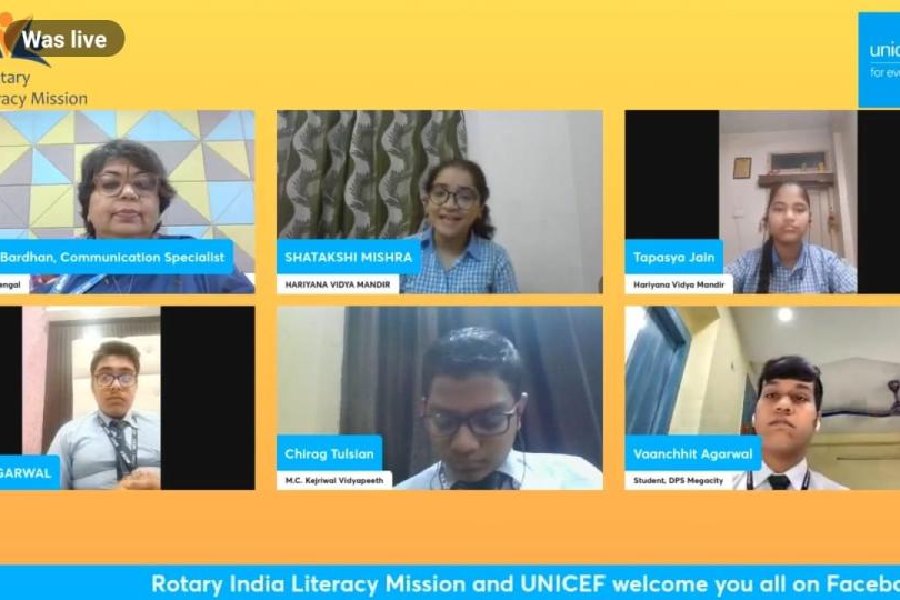Kids speak of rights, mental health


Children are not the property of their parents, a girl told a panel discussion last week.
A boy shared his experience of helping people in a village with rainwater harvesting.
A group of students from different city schools participated in a Facebook live session organised by Unicef and Rotary International to mark World Children’s Day on November 20.
Child labour, mental health and environmental awareness were among the subjects that the speakers harped on.
“Children are neither the property of their parents nor are they helpless objects of charity. Children are not meant to earn, they are meant to learn,” asserted Tapasya Jain of Hariyana Vidya Mandir, drawing applause from the guests, Sekhar Mehta, former president of Rotary International and Sudeshna Roy, chairperson of West Bengal Commission for Protection of Child Rights (WBCPCR).
“Child labour makes the children susceptible to various means of violence and unjust activity,” the Class IX said, propping up before the camera a self-made poster that said “Stop Child Labour”.
Chirag Tulsian, a Class IX student of MC Kejriwal Vidyapeeth, shared his experience of visiting his ancestral village during summer vacation.
“Children’s rights are being violated. I went to my village. I saw children were working to get money. What was the reason? Economic deprivation because of lack of rain or unseasonal rain affecting crops. The crop was damaged. The farmers had no money,” he said.
Chirag took it upon himself to teach one child in the village. Seeing one, many started to gather.
“As time passed, I also taught the children the basics of rainwater harvesting. How they could store and use unseasonal rainwater. The farmers also liked it. Just before I was about to leave, another spell of rain came down. But this time, the villagers were better prepared,” he said.
Chirag’s story prompted the moderator, Suchorita Bardhan, communication specialist of Unicef, to call him “inspirational”.
Roy, the chairperson of the state child rights panel, urged the teenage students to take care of the children of the workers in their houses, a cook, domestic help or a driver.
“These children are mostly the first-generation learners. You should make them aware of their rights,” she said.
“Each of us bears the responsibility to advocate for and protect the rights of children. My rights go hand in hand with my responsibilities. Investing in the protection and well-being of children is an investment for our future,” said Shatakshi Mishra, also from Hariyana Vidya Mandir.
Vaanchhit Agarwal, a Class XII student of DPS Megacity School, talked of the rising rate of suicides among teenagers.
“Huge academic stress exists because constructive steps to adopt an education system that favours a child have not been taken up,” he said.
He urged parents to be more empathetic towards their children and arrange for psychological support for them from experts.
Mehta, the former president of Rotary International, said that Unicef and Rotary would work together to address these issues.
Amit Mehrotra, chief of Unicef in Bengal, said: “In addition to working with government agencies, Unicef strives to forge partnerships and alliances with others to reach the most deprived. Amplification of children’s voices is essential for people to understand their cause.”